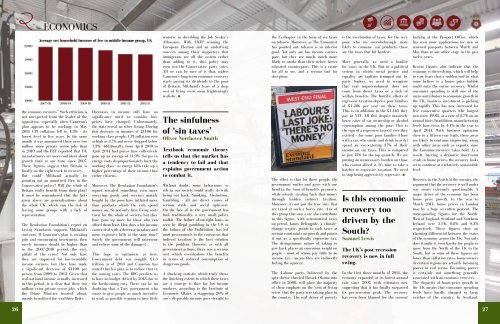The Future of Britain
You also want an ePaper? Increase the reach of your titles
YUMPU automatically turns print PDFs into web optimized ePapers that Google loves.
ECONOMICS<br />
the economy recovers.” Such criticism is<br />
not unexpected from the leader <strong>of</strong> the<br />
opposition, especially when Cameron’s<br />
plan appears to be working: in May<br />
2014 CPI inflation fell to 1.5% - its<br />
lowest level in five years. In the same<br />
month it was announced there were two<br />
million more private sector jobs than<br />
in 2010 and the EEF reported that UK<br />
manufacturers are more confident about<br />
growth than at any time since 2007.<br />
<strong>The</strong>se figures suggest that <strong>Britain</strong> is<br />
finally on the right track to recovery.<br />
But could Miliband actually be<br />
pointing out an unnoticed flaw in the<br />
Conservative policy? Will the whole <strong>of</strong><br />
<strong>Britain</strong> really benefit from their plan?<br />
It must be remembered that the facts<br />
given above are generalisations about<br />
the whole UK, which run the risk <strong>of</strong><br />
leaving some groups with a lack <strong>of</strong><br />
representation.<br />
<strong>The</strong> Resolution Foundation’s report on<br />
Living Standards supports Miliband’s<br />
concerns. If Cameron’s plan is creating<br />
jobs and encouraging investment, then<br />
surely incomes should be higher than<br />
in the 2007-2010 period, the very<br />
pitfall <strong>of</strong> the crisis? Not only have<br />
they not improved for low-to-middle<br />
income earners, but they have made<br />
a significant decrease <strong>of</strong> £1400 per<br />
person from 2009 to 2013. Given that<br />
real national income actually increased<br />
in this period, it is clear that those two<br />
million extra private sector jobs, which<br />
the Prime Minister boasted about,<br />
mainly benefitted the wealthier Brits.<br />
Decreases in income still have no<br />
significance until we consider how<br />
prices have changed. Unfortunately,<br />
the stats reveal no silver lining. During<br />
this decrease in incomes <strong>of</strong> £1400 for<br />
working class people, CPI inflation rose<br />
as high as 3.7% and never dropped below<br />
1.3%. Additionally, from April 2010 to<br />
April 2014 fuel prices have collectively<br />
gone up an average <strong>of</strong> 11.9%. Surges in<br />
energy costs disproportionately hurt the<br />
working class - as energy bills take up a<br />
higher percentage <strong>of</strong> their income than<br />
richer citizens.<br />
Moreover, <strong>The</strong> Resolution Foundation’s<br />
report revealed something even more<br />
worrying: goods and services mainly<br />
bought by the poor have inflated more<br />
than products which the rich spend<br />
money on. So not only have living costs<br />
risen for the whole <strong>of</strong> society, but they<br />
have gone up more for those who can<br />
afford them least. How does a low income<br />
earner deal with a decrease in salary and<br />
more expensive bills at the same time?<br />
Surely the government will intervene<br />
and relieve some <strong>of</strong> the damages?<br />
This hope is optimistic at best.<br />
Government debt was roughly £1.3<br />
trillion as <strong>of</strong> 2014 and Cameron has<br />
stated that his plan is to reduce that in<br />
the coming years. <strong>The</strong> BBC predicts us<br />
to have no budget deficit by 2018 due to<br />
the forthcoming cuts. <strong>The</strong>re can be no<br />
doubting that a Tory government who<br />
wants to give people as much incentive<br />
to work as possible is going to have little<br />
remorse in shredding the Job Seeker’s<br />
Allowance. With UKIP winning the<br />
European Election and an underlying<br />
concern among their supporters that<br />
immigrants are <strong>of</strong>f the system rather<br />
than adding to it, this policy may<br />
even win the Conservative party votes.<br />
All we can be sure <strong>of</strong> is that, unless<br />
Cameron’s long-term economic recovery<br />
starts paying its dividends to the poor<br />
<strong>of</strong> <strong>Britain</strong>, Miliband’s fears <strong>of</strong> a deep<br />
cost <strong>of</strong> living crisis seem frighteningly<br />
realistic. ƒ<br />
<strong>The</strong> sinfulness<br />
<strong>of</strong> ‘sin taxes’<br />
Oliver Northover Smith<br />
Textbook economic theory<br />
tells us that the market has<br />
a tendency to fail and that<br />
explains government action<br />
to combat it.<br />
Without doubt, some behaviours so<br />
rife in our society could really do with<br />
being cut back. Smoking, Alcoholism,<br />
Gambling – all are direct causes <strong>of</strong><br />
serious strife and social upheaval.<br />
On the face <strong>of</strong> it, the government has<br />
had, traditionally, a very small policy<br />
toolkit. <strong>The</strong> failure <strong>of</strong> outright bans, as<br />
seen by illegal gambling in the US or<br />
the failure <strong>of</strong> the Prohibition, has led<br />
most governments to the consensus that<br />
indirect taxation is the best solution<br />
to the problem. However, as with all<br />
government actions, there was a serious<br />
cost which overshadows the benefits<br />
in terms <strong>of</strong> reduced consumption <strong>of</strong><br />
dangerous goods.<br />
A shocking statistic which truly shows<br />
the shocking extent to which these taxes<br />
are a scourge is this: for low-income<br />
smokers, according to the Institute <strong>of</strong><br />
Economic Affairs, a staggering 20% <strong>of</strong><br />
one’s disposable income goes straight to<br />
the Exchequer in the form <strong>of</strong> sin taxes<br />
on tobacco. Moreover, as <strong>The</strong> Economist<br />
has pointed out, tobacco is an inferior<br />
good. Not only are low income earners<br />
poor, but they are much, much more<br />
likely to smoke than their richer, better<br />
educated counterparts. This is a crime<br />
for all to see, and a serious tool for<br />
deception.<br />
<strong>The</strong> effect is that for these people, the<br />
government smiles and gives with one<br />
hand in the form <strong>of</strong> benefits payments,<br />
while silently stealing back that money<br />
through hidden indirect taxation.<br />
Moreover, it’s not just the true ‘sins’ that<br />
are taxed at such a heavy rate. Any <strong>of</strong><br />
this group that own a car also contribute<br />
to this figure, with astronomical taxes<br />
on petrol. James Delingpole, a climatechange<br />
sceptic, points to such taxes as<br />
serious constraints on growth and points<br />
it out as a specifically regressive tax.<br />
<strong>The</strong> disingenuous nature <strong>of</strong> taking to<br />
give back places an enormous weight on<br />
people – most <strong>of</strong> whom pay little to no<br />
income tax – means they are indirectly<br />
feeling the squeeze.<br />
<strong>The</strong> Labour party, bolstered by the<br />
spin-doctor that led Barack Obama into<br />
<strong>of</strong>fice in 2008, will place the majority<br />
<strong>of</strong> their emphasis on the ‘cost <strong>of</strong> living<br />
crisis’ that the party sees taking place in<br />
the country. <strong>The</strong> real driver <strong>of</strong> poverty<br />
is the overburden <strong>of</strong> taxes. For the very<br />
poor, who are overwhelmingly more<br />
likely to consume ‘sin’ products, these<br />
are the taxes that hit hardest.<br />
More generally, we need a bonfire<br />
for taxes in the UK. But in a political<br />
system in which social justice and<br />
equality are taglines trumped out by<br />
party leaders, we need to recognise<br />
that real impoverishment does not<br />
come from direct taxes or a lack <strong>of</strong><br />
welfare benefits. <strong>The</strong> horrific effects <strong>of</strong><br />
regressive taxation deprive poor families<br />
<strong>of</strong> £1,286 per year on these taxes.<br />
This is in addition to the £1,165 they<br />
pay in VAT. All this despite massively<br />
lower rates <strong>of</strong> car ownership or alcohol<br />
consumption among the poor. This is<br />
the sign <strong>of</strong> a regressive taxes if ever they<br />
existed – for some poor families (those<br />
with a car, who smoke and drink heavily)<br />
spend an eye-watering 37% <strong>of</strong> their<br />
income on sin taxes. This is compared<br />
to just 15% for the top quintile. We are<br />
putting an unnecessary burden on those<br />
who cannot afford it. It’s time to take a<br />
hatchet to regressive taxation. We need<br />
to stop being aggressively regressive. ƒ<br />
Is this economic<br />
recovery too<br />
driven by the<br />
South?<br />
Samuel Lewis<br />
<strong>The</strong> UK’s post-recession<br />
recovery is now in full<br />
swing.<br />
In the first three months <strong>of</strong> 2014, the<br />
economy expanded at its fastest annual<br />
rate since 2007, with estimates now<br />
suggesting that it has finally surpassed<br />
its pre-recession peak. <strong>The</strong> recovery<br />
has even been blamed for the current<br />
backlog at the Passport Office, which<br />
has seen more applications for new or<br />
renewed passports between March and<br />
May than at any other stage in the past<br />
twelve years.<br />
Recent figures also indicate that the<br />
economy is diversifying, which will help<br />
to ease fears that a sudden end to what<br />
some believe is a house price bubble<br />
could ruin the entire recovery. Whilst<br />
consumer spending is still one <strong>of</strong> the<br />
main contributors to economic growth in<br />
the UK, business investment is picking<br />
up rapidly. This has now increased for<br />
five consecutive quarters (the longest<br />
run since 1998), at a rate <strong>of</strong> 8.7% on an<br />
annual basis. In addition, manufacturing<br />
levels have risen by 4.4% in the year to<br />
April 2014. With business optimism<br />
close to a fifteen-year high, these areas<br />
are likely to continue improving, along<br />
with other areas such as exports, once<br />
the Eurozone recovery takes hold. As a<br />
result, barring a dramatic short-term<br />
crash in house prices, the recovery looks<br />
set to continue at a relatively sustainable<br />
level.<br />
However, in the North <strong>of</strong> the country, the<br />
argument that the recovery is well under<br />
way seems extremely questionable. A<br />
major driver <strong>of</strong> the economy has been<br />
house price growth. In the year to<br />
March 2014, house prices in London<br />
rose by a huge seventten percent. <strong>The</strong><br />
corresponding figures for the North-<br />
West <strong>of</strong> England, Scotland and Northern<br />
Ireland were 3.1%, 0.8% and 0.3%<br />
respectively. <strong>The</strong>se figures show an<br />
alarming differential between the states<br />
<strong>of</strong> the economy across the UK. Not only<br />
does it make it even harder for people to<br />
move from the North <strong>of</strong> the UK to the<br />
South, but as some <strong>of</strong> these figures are<br />
lower than inflation rates, home-owners<br />
in certain regions are actually becoming<br />
poorer in real terms. Becoming poorer<br />
is certainly not something generally<br />
associated with an economic recovery.<br />
<strong>The</strong> disparity <strong>of</strong> house-price growth in<br />
the UK means that consumer spending<br />
levels have hardly changed in large<br />
swathes <strong>of</strong> the country. In Scotland,<br />
26<br />
27




